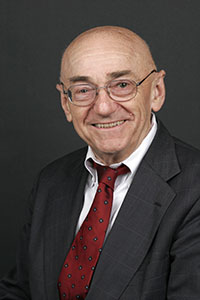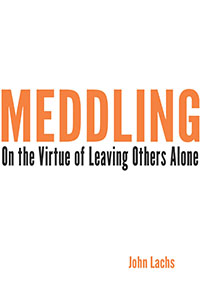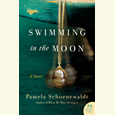Hands Off
Meddling is philosopher John Lachs’s plea for the freedom that comes from leaving others alone
In Meddling, Vanderbilt philosophy professor John Lachs considers two things: the conceptual foundations for what it means to leave other people alone, as well as the implications of those ideas for public policy and social interaction. A few of Lachs’s fellow philosophers will object to the thoughts that underpin the first task he has set himself here, while certain general readers will likely take issue with the second, if only on grounds of irony: this is a book about leaving others alone that inevitably involves telling people what they ought to do. This is the unavoidable trap that comes with writing about ethics.
 Lachs’s argument goes something like this: human life centers around individual bodies, each with a singular consciousness. Because each person’s activities and experiences are unique, each of us is the only person in any position to make a sound judgment about our own desires and values. Recognizing this reality in ourselves and others requires that we leave each other alone most of the time.
Lachs’s argument goes something like this: human life centers around individual bodies, each with a singular consciousness. Because each person’s activities and experiences are unique, each of us is the only person in any position to make a sound judgment about our own desires and values. Recognizing this reality in ourselves and others requires that we leave each other alone most of the time.
Lachs is not suggesting that we abandon one another or stop caring about others, however. We live in complex societies with institutions and divisions of labor, and we depend upon one another. For Lachs, the trouble arises when we come to believe that institutions possess some power or reality beyond the individual human beings who make them up. Traditions—or the fund of human knowledge deposited in our institutions—don’t determine who and what we are; they merely provide the background for our activities. All too often, Lachs figures, we forget that we are individual agents.
On those occasions when people do need our help, we should offer it without strings attached. Unfortunately, we tend to believe that such aid gives us the right to interfere in others’ lives by dictating their behavior. We prize our own freedom, but we take too much pleasure in exercising our will over others. In truth, Lachs says, helping others requires that we let them make their own decisions, even if it means that we disagree about the way they actually use our help. This is the risk we run, the price we pay.
After laying out these ideas, Lachs discusses a wide array of human interactions, from rearing children to caring for the aged, with many points in between. For example, he argues that unsolicited advice is divisive and “annoying.” In what sounds like hard-won wisdom, he contends, “The best way of communicating is to say little and to say it cautiously at the start, and watch for interest and willingness to hear more. How much should be said is thus a matter of judgment that requires both good sense and vigilance.”
 Lachs proves remarkably open to different lifestyles and delightfully curmudgeonly at the same time. Self-publishing, he writes, has left us awash in unwarranted ideas about what a person ought to do or be: “With the aid of ready access to the Internet, anyone can memorialize any worthless set of experiences. This is one of the awful consequences of the new power to publish one’s own writing, no matter how jejune, and thereby call attention to one’s ideas, no matter how infantile.” Not surprisingly, Lachs worries over so many people’s willingness to solicit advice from a growing number of new “experts” on the open market. The enormous growth of services dedicated to telling us what to do is for him surely symptomatic of the loss of autonomy that characterizes our age.
Lachs proves remarkably open to different lifestyles and delightfully curmudgeonly at the same time. Self-publishing, he writes, has left us awash in unwarranted ideas about what a person ought to do or be: “With the aid of ready access to the Internet, anyone can memorialize any worthless set of experiences. This is one of the awful consequences of the new power to publish one’s own writing, no matter how jejune, and thereby call attention to one’s ideas, no matter how infantile.” Not surprisingly, Lachs worries over so many people’s willingness to solicit advice from a growing number of new “experts” on the open market. The enormous growth of services dedicated to telling us what to do is for him surely symptomatic of the loss of autonomy that characterizes our age.
At times, Lachs connects this loss of autonomy to social policy. To avoid fostering dependence, he argues, help should generally be temporary. Once they become dependent, people can no longer make the choices necessary to shape their own lives. If this argument sounds familiar, that’s because it is: “In times of economic stress,” Lachs writes, “the number of welfare recipients grows until as much as a third of the population lives off the labor of the rest and nearly half pays no taxes but votes for politicians willing to increase benefits.” In a book that is for the most part blessedly free of political talking points, the inclusion of statistics like these is glaring. (The statistics themselves can also be misleading: Welfare recipients don’t simply live off the rest of us, for example, because a vast number of them are working families. And U.S. citizens who pay no income tax surrender a significantly greater percentage of their income to other forms of taxation, like sales tax, than so-called tax-paying citizens do.)
Still, Lachs is not in the business of ratifying a particular political agenda. Social conservatives won’t like his views on gay marriage or alternative lifestyles while progressives will take issue with his notion that welfare fosters dependence. This is what happens to when you get an honest libertarian in the house. Though some readers will certainly disagree with him on various points, Lachs has written a very readable book, and the careful and deliberate style with which he presents his ideas is surely welcome in our fractured political climate.

Peter Kuryla is an associate professor of history at Belmont University in Nashville, where he teaches a variety of courses having to do with American culture and writes scholarly articles about American political thought, literature, and the civil-rights movement.


